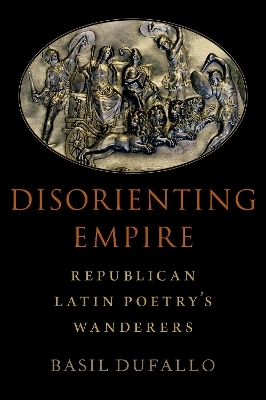
Disorienting Empire
Republican Latin Poetry's Wanderers
Seiten
2021
Oxford University Press Inc (Verlag)
978-0-19-757178-1 (ISBN)
Oxford University Press Inc (Verlag)
978-0-19-757178-1 (ISBN)
Disorienting Empire is the first book to examine Republican Latin poetry's recurring interest in characters who become lost. Basil Dufallo explains the prevalence of this theme with reference to the rapid expansion of Rome's empire in the Middle and Late Republic. It was both a threatening and an enticing prospect, Dufallo argues, to imagine the ever-widening spaces of Roman power as a place where one could become disoriented, both in terms of geographical wandering and in a more abstract sense connected with identity and identification, especially as it concerned gender and sexuality.
Plautus, Terence, Lucretius, and Catullus, as well as the "triumviral" Horace of Satires, book 1, all reveal an interest in such experiences, particularly in relation to journeys into the Greek world from which these writers drew their source material. Fragmentary authors such as Naevius, Ennius, and Lucilius, as well as prose historians including Polybius and Livy, add depth and context to the discussion. Setting the Republican poets in dialogue with queer theory and postcolonial theory, Dufallo brings to light both anxieties latent in the theme and the exuberance it suggests over new creative possibilities opened up by reorienting oneself toward new horizons, new identifications-by discovering with pleasure that one could be other than one thought. Further, in showing that the Republican poets had been experimenting with such techniques for generations before the Augustan Age, Disorienting Empire offers its close readings as a means of interpreting afresh Aeneas' wandering journey in Vergil's Aeneid.
Plautus, Terence, Lucretius, and Catullus, as well as the "triumviral" Horace of Satires, book 1, all reveal an interest in such experiences, particularly in relation to journeys into the Greek world from which these writers drew their source material. Fragmentary authors such as Naevius, Ennius, and Lucilius, as well as prose historians including Polybius and Livy, add depth and context to the discussion. Setting the Republican poets in dialogue with queer theory and postcolonial theory, Dufallo brings to light both anxieties latent in the theme and the exuberance it suggests over new creative possibilities opened up by reorienting oneself toward new horizons, new identifications-by discovering with pleasure that one could be other than one thought. Further, in showing that the Republican poets had been experimenting with such techniques for generations before the Augustan Age, Disorienting Empire offers its close readings as a means of interpreting afresh Aeneas' wandering journey in Vergil's Aeneid.
Basil Duffalo is Professor of Greek and Latin at the University of Michigan. His previous books include The Captor's Image and The Ghosts of the Past.
Acknowledgements
Abbreviations
Introduction
1. Double Vision: Plautus's Menaechmi and Rome's Nascent Empire
2. Wayward Sons and Wandering Bacchic Revels: Terence's Heautontimorumenos
3. Wandering Atoms, Roman Error, and Poetic Tradition in Lucretius
4. Catullan Wanderings: Traversing the Empire, Traversing the Self
5. Caesar's Mistakes and Horace's Errores: Publicizing Octavian's Authority in Satires, Book 1
Epilogue
The Aeneid's Reorientations
Bibliography
| Erscheinungsdatum | 19.07.2021 |
|---|---|
| Verlagsort | New York |
| Sprache | englisch |
| Maße | 249 x 163 mm |
| Gewicht | 1066 g |
| Themenwelt | Literatur ► Klassiker / Moderne Klassiker |
| Literatur ► Lyrik / Dramatik ► Lyrik / Gedichte | |
| Geisteswissenschaften ► Sprach- / Literaturwissenschaft ► Anglistik / Amerikanistik | |
| Geisteswissenschaften ► Sprach- / Literaturwissenschaft ► Literaturwissenschaft | |
| ISBN-10 | 0-19-757178-6 / 0197571786 |
| ISBN-13 | 978-0-19-757178-1 / 9780197571781 |
| Zustand | Neuware |
| Haben Sie eine Frage zum Produkt? |
Mehr entdecken
aus dem Bereich
aus dem Bereich
Deutsche Gedichte aus zwölf Jahrhunderten
Buch | Hardcover (2023)
C.H.Beck (Verlag)
28,00 €
Text, Übersetzung, Melodien, Kommentar
Buch | Softcover (2024)
De Gruyter (Verlag)
24,95 €


